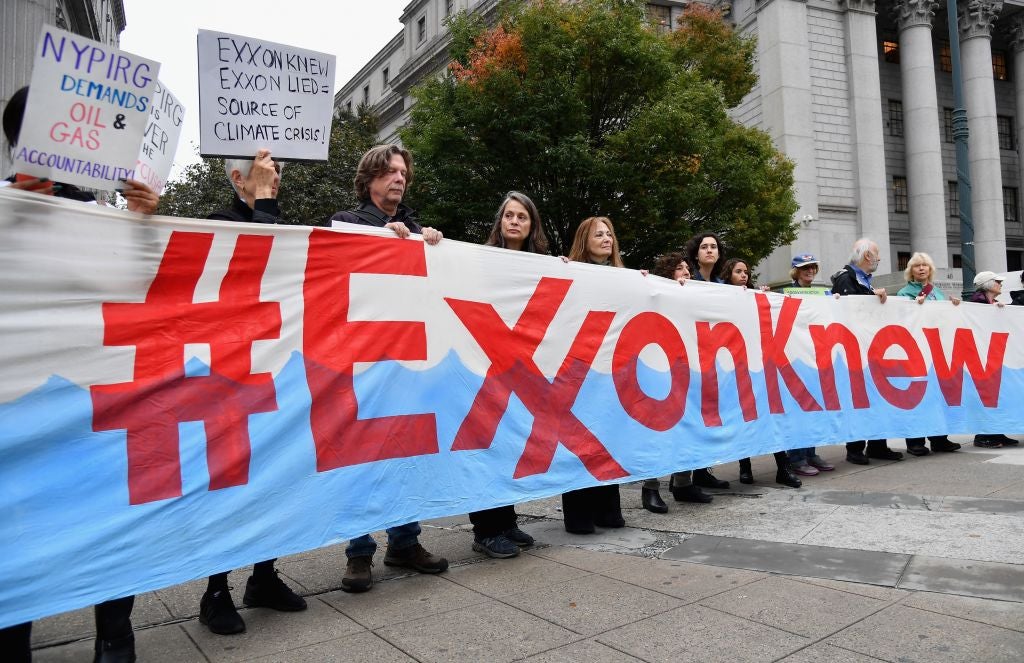Today, Big Oil CEOs will testify to Congress about climate change. It will be awkward — and politically explosive
These hearings are modeled on the Big Tobacco hearings that took place in the 1990s, and could be just as effective for changing public opinion


Your support helps us to tell the story
From reproductive rights to climate change to Big Tech, The Independent is on the ground when the story is developing. Whether it's investigating the financials of Elon Musk's pro-Trump PAC or producing our latest documentary, 'The A Word', which shines a light on the American women fighting for reproductive rights, we know how important it is to parse out the facts from the messaging.
At such a critical moment in US history, we need reporters on the ground. Your donation allows us to keep sending journalists to speak to both sides of the story.
The Independent is trusted by Americans across the entire political spectrum. And unlike many other quality news outlets, we choose not to lock Americans out of our reporting and analysis with paywalls. We believe quality journalism should be available to everyone, paid for by those who can afford it.
Your support makes all the difference.The years’ most important political event on climate change won’t be happening at COP26 in Glasgow next week, but in a stuffy hearing room in the US Capitol (and on Zoom) later today. That’s when the House Oversight Committee, Congress’s main investigative body, will host a hearing on climate disinformation with the executives of Exxon, Chevron, Shell, BP, the American Petroleum Institute and the US Chamber of Commerce.
This will be the first time that Big Oil CEOs have been called to testify before Congress about their position on the climate crisis. The hearing, and the ongoing investigation that surrounds it, could be the wrench that finally stops the gears of Big Oil’s political machine.
These hearings are modeled on the Big Tobacco hearings that took place in the 1990s. That’s when the CEOs of the largest tobacco companies famously came before Congress and lied about whether they knew cigarettes were addictive. At the time, no one thought of tobacco CEOs as saints, but watching them squirm and lie in Congress helped the public see them as the devils they were. The hearings solidified public opinion against Big Tobacco and opened up the political space not only for increased regulation, but also for a series of lawsuits that made the industry pay for some of the damage it had done to public health.
Thursday’s hearings could help do the same for Big Oil. We’ve been chipping away at the industry’s social license for the last decade with campaigns like fossil fuel divestment and #ExxonKnew, but there’s no substitute for seeing these CEOs getting grilled by members of Congress. We don’t know exactly what will come out of the hearing, but if political leaders are able to trap any of the executives in an outright lie, it could turbocharge the dozens of lawsuits that cities and states are bringing against Big Oil for climate damages. Even if they slither their way through the questioning, footage of these CEOs having to answer for their actions in a public forum will add momentum to the ongoing work of holding them accountable.
Excavating the industry’s history of denial won’t be enough, however. The key task for Members of Congress on Thursday is to bring the industry’s history into the present day: they need to move us beyond #ExxonKnew to #ExxonKnows and #ExxonLies.
We can expect the CEOs to sell us a redemption story about how they may once have been in the business of pollution, but now they’re fully committed to “net zero,” “carbon capture and sequestration,” “combating methane emissions,” and all the other buzzwords that allow them to pretend they care about climate action. These empty promises all have one purpose: delaying regulations that would accelerate our transition away from fossil fuels. The members on the committee will have to cut through this greenwashing and get at the truth: Big Oil is still hellbent on increasing the production of fossil fuels that are wrecking our climate.
If the Congressional investigation is going to be a success, it needs to uncover the ways that Big Oil is continuing to lobby against climate progress. This is key, because the industry’s political machine has gotten more sophisticated over the last decade. Gone are the days when Lee Raymond, the CEO of ExxonMobil, would outright reject the science of climate change. Now, Exxon’s CEO, Darren Woods, talks a big game about his commitment to climate action, even while his company runs millions of dollars of Facebook ads attacking climate legislation. These days, companies like Chevron don’t advertise their gasoline anymore; they’re too busy running ads with pretty pictures of wind turbines and solar panels, even while they’re using groups like the American Petroleum Institute to undermine legislation that would help make that clean energy future a reality. You can see the strategy play out in real time: according to a recent investigation by journalists Molly Taft and Emily Atkin, Chevron and the other oil giants have been doubling down on exactly this sort of solutions-focused advertising in the lead-up to today’s hearing.
Greenwashing is too kind a term for this new brand of industry propaganda, so let’s call it what it is: gaslighting. Big Oil’s strategy is to convince us that actually we’re to blame for the climate crisis and only they can help us get out of it. To pull this mind trick off, they’ve hired the world’s best PR firms and ad agencies to flood our airwaves and social media feeds with content that repositions Big Oil not as climate abusers, but as the only people who can save us from ourselves. (This use of advertising agencies and social media platforms is one of the reasons why it’s so important that the next round of these hearings will focus on the role of these third parties in aiding in the industry in the spread of disinformation).
Pulling off the industry’s shiny green hood and showing the dirty inner workings of their political machinery is the challenge that Members of Congress will take on today. To succeed, they’ll have to avoid getting lost in esoteric debates about carbon intensity and emissions trajectories and keep coming back to the heart of this story: a lot of companies knew they were driving the climate crisis, they lied to the American people about it, and they’re still lying today.
Jamie Henn is the head of Fossil Free Media
Join our commenting forum
Join thought-provoking conversations, follow other Independent readers and see their replies
Comments